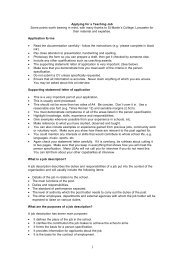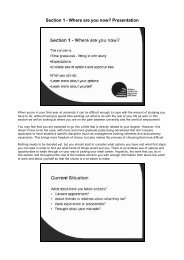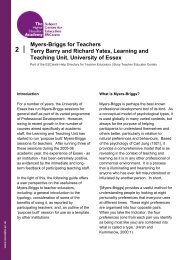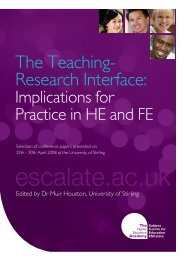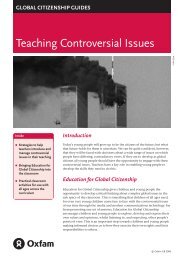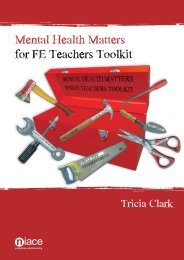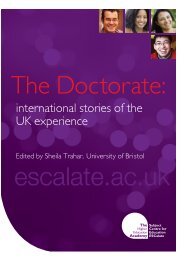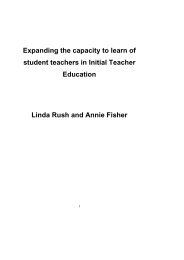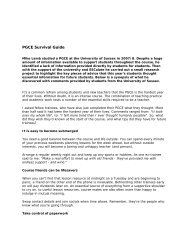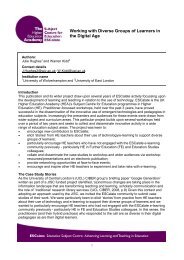pdf 4.2MB - ESCalate
pdf 4.2MB - ESCalate
pdf 4.2MB - ESCalate
You also want an ePaper? Increase the reach of your titles
YUMPU automatically turns print PDFs into web optimized ePapers that Google loves.
DISCUSSIONS IN EDUCATION SERIESmy compulsive need to make such terrifyingdemands on students who had never studied before.Others were simply bemused by the large numbersof presents I received at the end of every semester,almost always with the same message – ‘thank youfor forcing me to be better than I thought I was’.When it came to nominating a faculty member forconsideration for the University’s applicationprocedure, I think that one reason they chose mewas the sheer volume of flowers that arrived at theSchool of Education reception every term!paradox at the heart of my work: the university’sespoused mission was to change lives, and learningseemed to resonate with the notion that thestudents’ acceptance to study at university was at thecentre of all our work. But in this relentless focusupon being ‘life changing’ of the actual livedexperience of the students – their individual hopes,aspirations, triumphs – seemed to be cast intoshadow. For me personally it seemed as if we hadsomehow put aside what I saw as our centralpurpose to change one life at a time.In truth though, it was the flowers – and themessages – that made me decide not only that Icould engage with the National Teaching Fellowships,but also that I was demonstrating something original– excellence perhaps – in my work that was making aprofound difference to these students. When I joinedthe University I was what Hoyle (1975) would call a‘restricted’ professional in that my focus of teachingwas mainly on educational outcomes as a function ofclassroom behaviours. Hoyle and many others sincehave used this term critically when comparing it with‘extended professionalism’ that, they argue, takes amore sophisticated account of pedagogy, predicatedmultiply on context and collegiality as well. But it wasthis notion of the restricted professional thatcontributed to my eventual pedagogy and what forme, has contributed to a much deeper understandingof student learning. For me, there seemed to be aIn 2000, a year after I had commenced myemployment at the university, I began to understandand to question deeply for the first time, the receivedwisdom that being a so-called ‘extended’ professionalgave one a clearer view of pedagogy. I began carefullyto examine the possibility that being a ‘restricted’professional would allow me the freedom toexperiment with new forms of pedagogic relationshipthat put centre stage, students’ ‘lived experiences’ oflearning. It was these ideas that informed my workand that I sought to recount and describe in myNational Teaching Fellowship application. Although Ihave always found the idea of engaging in anythingthat is both public and competitive frankly terrifying, itis ironic that the reasons I was able to apply at allwere the contradictions and inconsistencies in myown background. At Sunderland I was bothcomforted by the familiarity of the students’18



